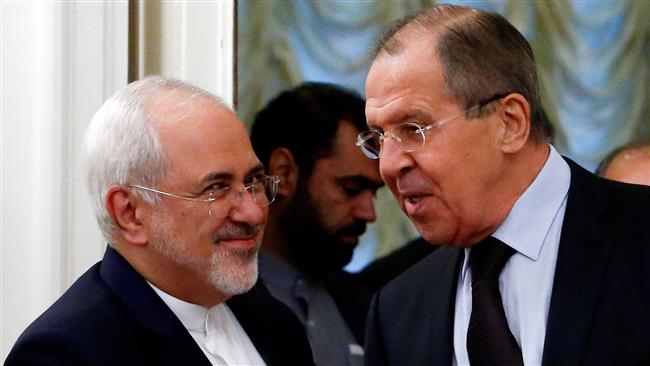
RNA - The Iranian foreign minister made the remarks at the end of a three-way meeting among him and his Russian and Syrian counterparts, Sergei Lavrov and Walid al-Muallem respectively, in Moscow on Friday on the latest developments in Syria.
Zarif said Tehran, Moscow and Damascus should reinforce their cooperation in the campaign against terrorism.
He stressed the importance of adopting strategies to stop the delivery of weapons and military equipment to the foreign-backed Takfiri militants wreaking havoc in Syria.
“The political settlement of the crisis in Syria will be possible through negotiations between the sides in order to put an end to this crisis,” Zarif said.
The three foreign ministers agreed to intensify the fight against terrorism and said their countries have a common stance on the anti-terror campaign in the region, particularly in Syria.
Lavrov said Iran, Russia and Syria have devised necessary steps for fighting terrorism and expressed their readiness to take measures that will play a key role in the campaign against the malicious phenomenon.
The Russian foreign minister added that the Moscow meeting highlighted the significance of a firm and efficient battle against terrorism in the Middle East, particularly in Syria.
He said the meeting’s participants also discussed ways to send humanitarian aid to civilians in Syria and stop the flow of weapons into the hands of terrorists operating in the war-hit country.
Muallem, for his part, said the US is making no effort to find a political solution to the Syrian crisis.
The Syrian foreign minister added that a recent agreement between Washington and Moscow, signed in the Swiss city of Geneva in September, failed to bear any fruit.
After marathon talks in Geneva, US Secretary of State John Kerry and his Russian counterpart reached an agreement on September 10 to impose a ceasefire in the Syrian city of Aleppo and to coordinate military operations against terrorist groups in the country.
Aleppo, Syria’s second largest city, remains divided between government forces in the west and foreign-backed terrorists in the east, making it a frontline battleground.
Russia, which has been conducting an aerial military campaign against extremist militants in Syria, has repeatedly voiced its readiness for a ceasefire. Russia has been insisting, however, that any such lull in fighting should be accompanied with a meticulous separation of terrorists from less extremist militants fighting against the Syrian government.
The Syrian foreign minister said Washington is not interested in solving the crisis in Damascus and takes measures only to serve the its own interests and those of its regional allies.
Since March 2011, Syria has been hit by militancy it blames on some Western states and their regional allies. Backed by the Russian air cover, the Syrian military is engaged in an operation to rid the country of Daesh and other terrorist groups.
The so-called Syrian Observatory for Human Rights and United Nations Special Envoy for Syria Staffan de Mistura have put the death toll from the Syria conflict at more than 300,000 and 400,000, respectively.
This is while the UN has stopped its official casualty count in Syria, citing its inability to verify the figures it receives from various sources.
Over the past few weeks, the Syrian forces have wrested control of several areas across the war-torn country as they press ahead with their counter-terrorism operations.
Zarif: Iran, Russia share strong anti-terror stance
Meanwhile, in a meeting with his Russian counterpart earlier on Friday, the Iranian foreign minister said Tehran and Moscow have “tough stances in the fight against terrorism in the region through common strategies.”
“Tehran and Moscow have broad cooperation on regional issues such as the campaign against terrorism and extremism and we share views [on these matters],” Zarif added.
He also noted that Iran and Russia have succeeded in making considerable progress in all fields including in economic and political sectors as well as regional and international developments.
"I am pleased that in recent years relations between the Islamic Republic of Iran and the Russian Federation, as two good neighbors and two key players, have made many positive developments,” Zarif said.
Lavrov, for his part, said Tehran and Moscow urged cooperation on an unrelenting approach to terrorists operating against the Syrian government.
Iran and Russia have similar stances on the ongoing deadly crisis in Syria. Moscow and Tehran reject any foreign interference in the affairs of the war-hit country, stressing that only the Syrians are entitled to decide their own fate.
Iran has been providing military advisory assistance to the Syrian government in its campaign against terrorism.
Iran, Syria FMs discuss anti-terror cooperation
Also in Moscow on Friday, the Iranian and Syrian foreign ministers held bilateral talks about ways to improve cooperation on the battle against terrorism in Syria and the status quo in the region.
Zarif and Muallem stressed the importance of strengthening cooperation among Tehran, Moscow and Damascus to eradicate terrorism.
847/940